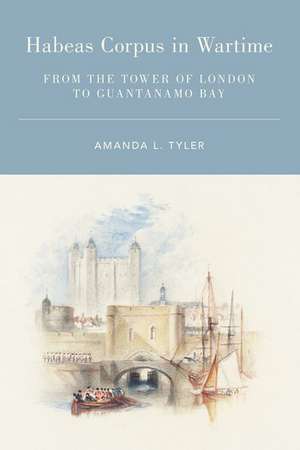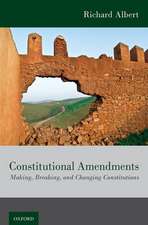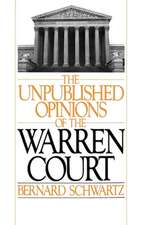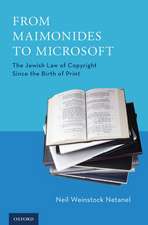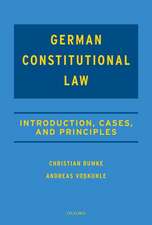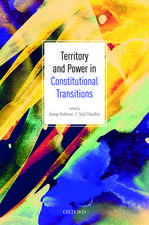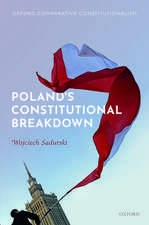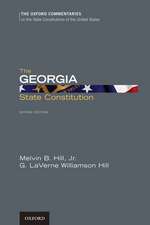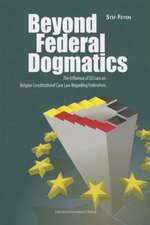Habeas Corpus in Wartime: From the Tower of London to Guantanamo Bay
Autor Amanda L. Tyleren Limba Engleză Paperback – 6 dec 2019
| Toate formatele și edițiile | Preț | Express |
|---|---|---|
| Paperback (1) | 286.04 lei 10-16 zile | |
| Oxford University Press – 6 dec 2019 | 286.04 lei 10-16 zile | |
| Hardback (1) | 719.25 lei 31-37 zile | |
| Oxford University Press – 28 dec 2017 | 719.25 lei 31-37 zile |
Preț: 286.04 lei
Preț vechi: 351.48 lei
-19% Nou
Puncte Express: 429
Preț estimativ în valută:
54.75€ • 57.52$ • 46.01£
54.75€ • 57.52$ • 46.01£
Carte disponibilă
Livrare economică 07-13 februarie
Preluare comenzi: 021 569.72.76
Specificații
ISBN-13: 9780190090265
ISBN-10: 019009026X
Pagini: 466
Dimensiuni: 231 x 155 x 31 mm
Greutate: 0.68 kg
Editura: Oxford University Press
Colecția OUP USA
Locul publicării:New York, United States
ISBN-10: 019009026X
Pagini: 466
Dimensiuni: 231 x 155 x 31 mm
Greutate: 0.68 kg
Editura: Oxford University Press
Colecția OUP USA
Locul publicării:New York, United States
Recenzii
In Habeas Corpus in Wartime: From the Tower of London to Guantanamo Bay, Amanda Tyler undertakes "to lay out as comprehensively as possible the full story of the legal and political history of the constitutional privilege of the writ of habeas corpus." She does so with care and style ... Well into the 20th century, as Tyler painstakingly documents, the consensus understanding remained consistent: '[T]he origins and long-standing interpretation of the Suspension Clause understood it to prohibit the government, in the absence of a valid suspension, from detaining persons who can claim the protection of domestic law outside the criminal process, even in wartime.' Even in wartime. Especially in wartime.
Amanda Tyler has written the definitive political and legal history of the writ of habeas corpus during war, from its modern origins in the seventeenth century England to its contemporary use by U.S. courts to check the Commander in Chief in the post-9/11 era. Since the writ's history is so relevant to its modern scope, Habeas Corpus in Wartime will be an indispensable guide for lawyers, judges, and scholars of various stripes who grapple with the meaning of the Great Writ." - Jack Goldsmith, Henry L. Shattuck Professor of Law, Harvard Law School
This meticulously researched book shows how America's Founding Fathers constitutionalised the English Habeas Corpus Act, which provided that only parliament could suspend the writ of liberty. In a series of studies which are rich both in illustration and insight, Amanda Tyler shows how the long-held understanding of the Suspension Clause came under pressure in the twentieth century. The history she has written is not only fascinating in itself, but has important ramifications for contemporary debates on liberty and the constitution." - Michael Lobban, Professor of Legal History, London School of Economic
In this carefully researched book, Amanda Tyler provides a comprehensive history of the complicated ways in which Americans have used-and sometimes abused-the 'great writ' of habeas corpus in times of war or national emergency. Tyler traces this story to its English origins, which Americans studied closely. But more important, she provides a searching account of the controversies that have surrounded the suspension or evasion of habeas corpus, from the American Revolution to our own post-September 11 era." - Jack Rakove, Professor of History and Political Science, Stanford University
In her expansive, intensive, and highly readable exploration of the history of the 'Great Writ' in times of crisis, Professor Tyler has illuminated the past and informed the present understanding of the critical role of habeas corpus as a bulwark against the abuse of power. Her in-depth, original study of Anglo-American materials helps foster an appreciation of the prominent place of the writ in state and federal constitutions." - David L. Shapiro, William Nelson Cromwell Professor of Law, Emeritus, Harvard Law School
As colonists, as revolutionaries, and as an independent people, Americans have always revered the English writ of habeas corpus. Professor Tyler tells a tale that is sometimes heartening, more often distressing, yet always illuminating. No one has offered a better exposition of the Constitution's Suspension Clause and of American struggles in wartime to define our most basic liberty: freedom from wrongful detention." - Paul Halliday, Julian Bishko Professor of History & Professor of Law, University of Virginia
We owe Tyler a considerable debt for clarifying the interaction of habeas, treason, allegiance, preventive detention, martial law and trial by military commission; her careful study illuminates much that was previously obscure. Modern legal scholars and federal judges will turn confidently to Tyler on Habeas in much the way nineteenth century jurists invoked Story on the Constitution. As with any progressive account of constitutional history, we're left to wonder how much work history can do in answering the constitutional questions of today. But history gives us an entry point for our assessment, revealing practices and meanings that were both embedded in and layered upon constitutional texts. Having completed one extraordinary historical marathon, Tyler shows every sign of being able to tackle several more. We turn the last page of this magnificent book and find ourselves looking forward to Tyler's next."- Professor James E. Pfander, Lawfare
Professor Tyler focuses on the role that habeas corpus and its suspension have played in English and American wars since the 17th century. Her definitive history establishes that the notion that American citizens can be detained for a lengthy period without a criminal charge or a suspension of the writ was invented in the 20th century and is totally at odds with the Framers' view."- Gerard N. Magliocca, Balkinization
Professor Amanda Tyler offers a searing look at episodes in U.S. history when the federal government undermined its citizens' legal rights during times of war... Her critique reveals an incremental breakdown of habeas corpus, starting with the American Revolution and continuing through the war on terror."- Susan Gluss, BerkleyLaw
Amanda Tyler has written the definitive political and legal history of the writ of habeas corpus during war, from its modern origins in the seventeenth century England to its contemporary use by U.S. courts to check the Commander in Chief in the post-9/11 era. Since the writ's history is so relevant to its modern scope, Habeas Corpus in Wartime will be an indispensable guide for lawyers, judges, and scholars of various stripes who grapple with the meaning of the Great Writ." - Jack Goldsmith, Henry L. Shattuck Professor of Law, Harvard Law School
This meticulously researched book shows how America's Founding Fathers constitutionalised the English Habeas Corpus Act, which provided that only parliament could suspend the writ of liberty. In a series of studies which are rich both in illustration and insight, Amanda Tyler shows how the long-held understanding of the Suspension Clause came under pressure in the twentieth century. The history she has written is not only fascinating in itself, but has important ramifications for contemporary debates on liberty and the constitution." - Michael Lobban, Professor of Legal History, London School of Economic
In this carefully researched book, Amanda Tyler provides a comprehensive history of the complicated ways in which Americans have used-and sometimes abused-the 'great writ' of habeas corpus in times of war or national emergency. Tyler traces this story to its English origins, which Americans studied closely. But more important, she provides a searching account of the controversies that have surrounded the suspension or evasion of habeas corpus, from the American Revolution to our own post-September 11 era." - Jack Rakove, Professor of History and Political Science, Stanford University
In her expansive, intensive, and highly readable exploration of the history of the 'Great Writ' in times of crisis, Professor Tyler has illuminated the past and informed the present understanding of the critical role of habeas corpus as a bulwark against the abuse of power. Her in-depth, original study of Anglo-American materials helps foster an appreciation of the prominent place of the writ in state and federal constitutions." - David L. Shapiro, William Nelson Cromwell Professor of Law, Emeritus, Harvard Law School
As colonists, as revolutionaries, and as an independent people, Americans have always revered the English writ of habeas corpus. Professor Tyler tells a tale that is sometimes heartening, more often distressing, yet always illuminating. No one has offered a better exposition of the Constitution's Suspension Clause and of American struggles in wartime to define our most basic liberty: freedom from wrongful detention." - Paul Halliday, Julian Bishko Professor of History & Professor of Law, University of Virginia
We owe Tyler a considerable debt for clarifying the interaction of habeas, treason, allegiance, preventive detention, martial law and trial by military commission; her careful study illuminates much that was previously obscure. Modern legal scholars and federal judges will turn confidently to Tyler on Habeas in much the way nineteenth century jurists invoked Story on the Constitution. As with any progressive account of constitutional history, we're left to wonder how much work history can do in answering the constitutional questions of today. But history gives us an entry point for our assessment, revealing practices and meanings that were both embedded in and layered upon constitutional texts. Having completed one extraordinary historical marathon, Tyler shows every sign of being able to tackle several more. We turn the last page of this magnificent book and find ourselves looking forward to Tyler's next."- Professor James E. Pfander, Lawfare
Professor Tyler focuses on the role that habeas corpus and its suspension have played in English and American wars since the 17th century. Her definitive history establishes that the notion that American citizens can be detained for a lengthy period without a criminal charge or a suspension of the writ was invented in the 20th century and is totally at odds with the Framers' view."- Gerard N. Magliocca, Balkinization
Professor Amanda Tyler offers a searing look at episodes in U.S. history when the federal government undermined its citizens' legal rights during times of war... Her critique reveals an incremental breakdown of habeas corpus, starting with the American Revolution and continuing through the war on terror."- Susan Gluss, BerkleyLaw
Notă biografică
Amanda L. Tyler is a Professor of Law at the University of California, Berkeley School of Law, where she teaches and writes about the federal courts, the Supreme Court, constitutional law, legal history, and civil procedure. Professor Tyler's scholarship has been published in leading law journals, including the Harvard Law Review, the Yale Law Journal, and the Stanford Law Review. She also serves as a co-editor of Hart and Wechsler's The Federal Courts and the Federal System. Professor Tyler is a graduate of Stanford University and Harvard Law School. Following law school, she served as law clerk to the Honorable Guido Calabresi at the United States Court of Appeals for the Second Circuit and the Honorable Ruth Bader Ginsburg at the Supreme Court of the United States. She has run eight Boston marathons.
